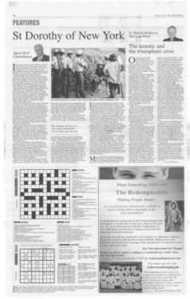Page 2, 18th April 2008
Page 2

Report an error
Noticed an error on this page?If you've noticed an error in this article please click here to report it.
Tags
Share
Related articles
We Can't Treat Islam The Same As Christianity, Says Bbc...
Humanist To Advise Bbc On Religious Output
Bishop Urges Support For Public Service Bbc
Our Faith In The Bbc
Beeb Tells Catholics That Popetown Is 'essentially
BBC chief:
we will not censor debate on religion
BY ED WEST
THE DIRECTOR General of the BBC has defended the corporation's treatment of religion at a lecture in which he also spoke about broadcasters' fear of Islam.
Mark Thompson, a practising Catholic, was speaking at one of the Cardinal's Lectures at Westminster Cathedral, a series of six public speeches sponsored by the Forte family in honour of their late father, Lord Forte.
Mr Thompson said: "There is no point having a BBC which isn't prepared to stand up and be counted, which will do everything it can to mitigate potential religious offence; but which will always be forthright in the defence of freedom of speech and of impartiality."
He said that the BBC and other major channels "have a special responsibility" to ensure that debates about 'faith and society" and about any religion "should not be foreclosed or censored".
And he defended the decision to broadcast ferry Springer: The Opera, a musical comedy that led to 55,000 complaints from the public, and an attempted private prosecution by pressure group Christian Voice.
But Mr Thompson also warned broadcasters about being overcautious in their reporting of Islam, and said there "a growing nervousness about discussion about Islam and its relationship to the traditions and values of British and Western society as a whole". The 50-year-old Director General is from an Irish Catholic background and attended the Jesuit-run Stonyhurst College. Despite leading a corporation that has been accused of anti-Christian bias he admits to being a church-going Catholic.
His lecture, "Faith and the Media", discussed how religious broadcasting had changed from the 1960s, when it had a largely secularist perspective, to the present day, where faith-oriented programmes tap a "sharp revival of interest in the spiritual potential".
He contrasted The Passion,a traditional portrayal of Jesus Christ's last days written by Frank Deasey, with the attempt to tell the story of his life in Dennis Potter's Son of Man, which in 1969 depicted Christ as plagued by self-doubt.
He said: "It is quite simply inconceivable that the BBC in the 1970s or 80s or indeed the 90s would have [shown] a drama about Christ's Passion across BBC One's primetime schedule."
But John Beyer, director of Mediawatch-UK, said that freedom of speech should not be confused with freedom to cause gratuitous offence.
"The BBC has maintained its religious output at a time when other broadcasters have abandoned it. One has to praise the BBC for that," he said. "But the remarks made by Mark Thompson have to be seen against the background of the BBC's new charters. This notion that freedom of expression trumps all concerns is not what the public expects. The BBC has this reputation for impartiality and fairness, but that they have this right to offend people, I would reject that. An awful lot of people find some programming offensive, and the BBC does not have a role in deliberately causing offence. That is no part of the BBC's remit.
"I think what we're suffering from in the religious communities is a great deal of disrespect. Religion is something that people do take seriously. A lot of people have a religious belief and for him to suggest the BBC has the right to offend people does not have anything to do with the BBC. We don't have the right not to pay the licence fee.
"It does not mean the BBC should not investigate religion stories. But the whole foundation of the BBC should be to let nation speak peace to each other. If they're going to abandon that let them abandon the licence fee. People do find offensive a lot of what is on television but no one cares, but the media fraternity doesn't understand what causes offence."
Editorial comment: Page 11
blog comments powered by Disqus

















